- Forum
- categories
- Resource recovery
- Fertiliser, soil conditioner, production of crops
- Would you buy tomatoes fertilized with urine?
Would you buy tomatoes fertilized with urine?
6703 views
- AndreaB
-
Less
- Posts: 1
- Likes received: 2
Re: Would you buy tomatoes fertilized with urine?
Well, I started a test with the dripper last year - so the tomatoes where really nice - and I had a lot tomatoes (compared to the years before). There was no smell at all - as the urin only came out of the dripper in a depth of several cm....
So yes, I do it them....
So yes, I do it them....
The following user(s) like this post: paresh, Robert74
Please Log in to join the conversation.
You need to login to reply- lourdesv
-

- Moderator
- Arquitecta, trabajando en temas de agua, saneamiento y medio ambiente desde el año 2003, creo en estrategias de educación ambiental y cambio de comportamiento. En mi día a día trato de dejar un mundo mejor al prójimo.
Less- Posts: 34
- Likes received: 13
The demand for phosphorus and nitrogen for agriculture is increasing, for this it is important to promote the closure of the nutrient cycle. The use of phosphorus, which is traditionally obtained from mineral deposits, has become necessary to increase crop yields, but phosphorus mineral deposits are concentrated in a few countries and global reserves are increasingly decreasing, finding substitutes is important. for the agriculture sector.
It is important to visualize three themes that go hand in hand: 1. Reuse of wastewater or urine for agriculture. 2. Sanitary barriers 3. Closure of the nutrient cycle
1. Reuse of wastewater or urine for agriculture : The scarcity of water, the desire to economize on fertilizers and the need to expand agricultural production are the main reasons for the use of wastewater.With appropriate management it is possible to increase crop yields since wastewater contains organic material, nitrogen, phosphorus and potassium. These nutrients can reduce or completely eliminate the need for fertilizer applications.In most cases, wastewater is used in its raw state without treatment. Farmers illegally taking sewer water or illegally extracting open drainage channels is common. The objective is to find methods with which we take advantage of wastewater while protecting health.Wastewater is a valuable resource, as is urine . By reusing them we contribute to the conservation of water resources and at the same time obtain benefits in the agricultural sector.
2. Sanitary barriers: They allow us to take key measures to protect health by taking advantage of and reusing wastewater or urine.The following measures are considered health protection barriers:
Crop restriction
Application methods
Human exposure
Treatment or disinfection levels
3. Closure of the nutrient cycle :An adult generates 500 liters of urine and 50 liters of feces in 1 year. This amount of excreta is diluted in 15 thousand liters of clean water, generating 15,500 liters of (contaminated) wastewater.The new paradigm is to recognize that human excreta is a resource that can be recovered, treated and reused safely, to return nutrients (phosphorus and nitrogen) to the earth.
La demanda de fosforo y nitrogeno para la agricultura es cada vez mayor, para esto es importante fomentar el cierre de ciclo de nutrientes. El uso del fósforo que tradicionalmente se obtiene de depósitos minerales, se ha vuelto necesario para aumentar el rendimiento de los cultivos, pero los depositos minerales de fosforo, se concentra en unos pocos países y las reservas mundiales disminuyen cad vez más, encontrar sustitutos es importanete para el sector de la agricultura.
Es importante visualizar tres temas que van de la mano: 1. Reúso de aguas residuales o de orina para la agricultura. 2. Barreras sanitarias 3. Cierre de ciclo de nutrientes
1. Reúso de aguas residuales o de orina para la agricultura : La escasez de agua, el deseo de economizar en fertilizantes y la necesidad de ampliar la producción agrícola son las principales razones para el aprovechamiento de aguas residuales. Con un manejo apropiado es posible incrementar el rendimiento de los cultivos ya que las aguas residuales contiene material orgánico, nitrógeno, fosforo y potasio. Estos nutrientes pueden reducir o eliminar por completo la necesidad de aplicación de fertilizantes.En la mayoría de los casos las aguas residuales se aprovechan en estado bruto sin tratamiento. Es común la toma ilegal de agricultores de aguas de alcantarilla o la extracción ilegal de canales de desagüe abiertos. El objetivo es encontrar métodos con los que aprovechemos las aguas residuales protegiendo la salud. Las aguas residuales son un recurso valioso, asi como la orina . Al reutilizarlas contribuimos a la conservación del recurso hídrico y a la vez obtenemos beneficios en el sector agricola.
2. Barreras sanitarias: Nos permiten tomar medidas clave para proteger la salud al aprovechar y reusar aguas residuales o la orina. Las siguientes medidas se consideran barreras de protección sanitaria:
Restricción de cultivos
Métodos de aplicación
Exposición humana
Niveles de tratamiento o desinfección
3. Cierre de ciclo de nutrientes : Un adulto genera 500 litros de orina y 50 litros de heces en 1 año. Esta cantidad de excretas, se diluye en 15 mil litros de agua limpia, generando 15.500 litros de aguas residuales (contaminadas).El nuevo paradigma es reconocer que las excretas humanas son un recurso que puede ser recuperado, tratado y reutilizado de manera segura, para devolver los nutrientes (fosforo y nitrógeno) a la tierra.
It is important to visualize three themes that go hand in hand: 1. Reuse of wastewater or urine for agriculture. 2. Sanitary barriers 3. Closure of the nutrient cycle
1. Reuse of wastewater or urine for agriculture : The scarcity of water, the desire to economize on fertilizers and the need to expand agricultural production are the main reasons for the use of wastewater.With appropriate management it is possible to increase crop yields since wastewater contains organic material, nitrogen, phosphorus and potassium. These nutrients can reduce or completely eliminate the need for fertilizer applications.In most cases, wastewater is used in its raw state without treatment. Farmers illegally taking sewer water or illegally extracting open drainage channels is common. The objective is to find methods with which we take advantage of wastewater while protecting health.Wastewater is a valuable resource, as is urine . By reusing them we contribute to the conservation of water resources and at the same time obtain benefits in the agricultural sector.
2. Sanitary barriers: They allow us to take key measures to protect health by taking advantage of and reusing wastewater or urine.The following measures are considered health protection barriers:
Crop restriction
Application methods
Human exposure
Treatment or disinfection levels
3. Closure of the nutrient cycle :An adult generates 500 liters of urine and 50 liters of feces in 1 year. This amount of excreta is diluted in 15 thousand liters of clean water, generating 15,500 liters of (contaminated) wastewater.The new paradigm is to recognize that human excreta is a resource that can be recovered, treated and reused safely, to return nutrients (phosphorus and nitrogen) to the earth.
La demanda de fosforo y nitrogeno para la agricultura es cada vez mayor, para esto es importante fomentar el cierre de ciclo de nutrientes. El uso del fósforo que tradicionalmente se obtiene de depósitos minerales, se ha vuelto necesario para aumentar el rendimiento de los cultivos, pero los depositos minerales de fosforo, se concentra en unos pocos países y las reservas mundiales disminuyen cad vez más, encontrar sustitutos es importanete para el sector de la agricultura.
Es importante visualizar tres temas que van de la mano: 1. Reúso de aguas residuales o de orina para la agricultura. 2. Barreras sanitarias 3. Cierre de ciclo de nutrientes
1. Reúso de aguas residuales o de orina para la agricultura : La escasez de agua, el deseo de economizar en fertilizantes y la necesidad de ampliar la producción agrícola son las principales razones para el aprovechamiento de aguas residuales. Con un manejo apropiado es posible incrementar el rendimiento de los cultivos ya que las aguas residuales contiene material orgánico, nitrógeno, fosforo y potasio. Estos nutrientes pueden reducir o eliminar por completo la necesidad de aplicación de fertilizantes.En la mayoría de los casos las aguas residuales se aprovechan en estado bruto sin tratamiento. Es común la toma ilegal de agricultores de aguas de alcantarilla o la extracción ilegal de canales de desagüe abiertos. El objetivo es encontrar métodos con los que aprovechemos las aguas residuales protegiendo la salud. Las aguas residuales son un recurso valioso, asi como la orina . Al reutilizarlas contribuimos a la conservación del recurso hídrico y a la vez obtenemos beneficios en el sector agricola.
2. Barreras sanitarias: Nos permiten tomar medidas clave para proteger la salud al aprovechar y reusar aguas residuales o la orina. Las siguientes medidas se consideran barreras de protección sanitaria:
Restricción de cultivos
Métodos de aplicación
Exposición humana
Niveles de tratamiento o desinfección
3. Cierre de ciclo de nutrientes : Un adulto genera 500 litros de orina y 50 litros de heces en 1 año. Esta cantidad de excretas, se diluye en 15 mil litros de agua limpia, generando 15.500 litros de aguas residuales (contaminadas).El nuevo paradigma es reconocer que las excretas humanas son un recurso que puede ser recuperado, tratado y reutilizado de manera segura, para devolver los nutrientes (fosforo y nitrógeno) a la tierra.
Lourdes Valenzuela
Regional SuSanA Coordinator (Latinoamérica)
Directora de comunicación AGUATUYA
Calle Nicolás Ortiz no. 33 (a media cuadra de la Av. Calampampa)
Tel (591) 4 424 2164
Casilla 6264
Cochabamba – Bolivia
Siguenos:
www.aguatuya.org
www.facebook.com/aguatuya
www.susana.org/en/mailinglist-latinoamerica
Regional SuSanA Coordinator (Latinoamérica)
Directora de comunicación AGUATUYA
Calle Nicolás Ortiz no. 33 (a media cuadra de la Av. Calampampa)
Tel (591) 4 424 2164
Casilla 6264
Cochabamba – Bolivia
Siguenos:
www.aguatuya.org
www.facebook.com/aguatuya
www.susana.org/en/mailinglist-latinoamerica
The following user(s) like this post: Taber
Please Log in to join the conversation.
You need to login to reply
Hello Robert,
Interesting, indeed, the findings of Renaud. Compost definitely needs a bit of ‘acceleration’, and urine is ideal for that purpose!
About pathogens : Urine – assuming a near perfect separation – is known to transmit only very few diseases, if any at all, and these germs are known to be killed within a few days of storage of the urine. It’s, indeed, the ammonia probably responsible for this, but temperature also plays a role.
The recommendations of WHO are set such that a cross-contamination with feces does not cause diseases, so these figures are very conservative. However, on page 71 of the “Guidelines for the Safe Use of Wastewater, Excreta and Graywater, Volume 4: Excreta and graywater use in agriculture” (see the attachment), it is saying:
“Direct use after collection or a short storage time is acceptable at the single household level.”
Starting on page 34, you will find a description of pathogens that are found in urine. The ones that pose a risk of transmission via urine are some bacteria: Leptospira (causing leptospirosis) and Salmonella (typhus, etc.) species, and then Schistosoma haematobioum (a variety of bilharcia found in Africa). These are all Gram-negative bacteria which are reduced by 90% within one day of storage or the urine – see page 41 of the guidelines. So, after 14 days of storage as I am recommending, there is virtually nothing left of these bacteria. To control Schistosoma, I would think you would have pay attention not to allow the urine to get into a water body (aquaculture, etc.).
About odor: My experience would be that the odor nuisance peaks at about a week or so of storage, and then the odor changes to that intense odor of ammonia. As you and Renaud yourselves explained to me on the Rich Earth Summit, the addition of some vinegar will significantly reduce this type of odor. This is due to the reduction of pH, causing the ammonia (an aggressive gas) to be converted to ammonium (an ion dissolved in water). I tried the trick, and it works very well. For my purposes, using some precautions like flushing with pure water after the application, etc. (see the paper I mentioned in my previous comment), this is good enough. But I am living in a semi-rural environment where there is some tolerance to odors, it seems. In any case, I have never heard complaints. But I can imagine that in a city environment the devices you are selling can help a lot to control odor and to make the application of urine acceptable.
About earth worms: I made the sad experience that earth worms were killed when I applied too much urine. You should never apply more than one liter of urine per square meter in one application. In addition, I could imagine that the addition of some vinegar could help since it’s, again,
probability the ammonia that is causing the deaths.
So, the instruction regarding vinegar that I learnt at the Rich Earth Summit was really useful!
H-A
Interesting, indeed, the findings of Renaud. Compost definitely needs a bit of ‘acceleration’, and urine is ideal for that purpose!
About pathogens : Urine – assuming a near perfect separation – is known to transmit only very few diseases, if any at all, and these germs are known to be killed within a few days of storage of the urine. It’s, indeed, the ammonia probably responsible for this, but temperature also plays a role.
The recommendations of WHO are set such that a cross-contamination with feces does not cause diseases, so these figures are very conservative. However, on page 71 of the “Guidelines for the Safe Use of Wastewater, Excreta and Graywater, Volume 4: Excreta and graywater use in agriculture” (see the attachment), it is saying:
“Direct use after collection or a short storage time is acceptable at the single household level.”
Starting on page 34, you will find a description of pathogens that are found in urine. The ones that pose a risk of transmission via urine are some bacteria: Leptospira (causing leptospirosis) and Salmonella (typhus, etc.) species, and then Schistosoma haematobioum (a variety of bilharcia found in Africa). These are all Gram-negative bacteria which are reduced by 90% within one day of storage or the urine – see page 41 of the guidelines. So, after 14 days of storage as I am recommending, there is virtually nothing left of these bacteria. To control Schistosoma, I would think you would have pay attention not to allow the urine to get into a water body (aquaculture, etc.).
About odor: My experience would be that the odor nuisance peaks at about a week or so of storage, and then the odor changes to that intense odor of ammonia. As you and Renaud yourselves explained to me on the Rich Earth Summit, the addition of some vinegar will significantly reduce this type of odor. This is due to the reduction of pH, causing the ammonia (an aggressive gas) to be converted to ammonium (an ion dissolved in water). I tried the trick, and it works very well. For my purposes, using some precautions like flushing with pure water after the application, etc. (see the paper I mentioned in my previous comment), this is good enough. But I am living in a semi-rural environment where there is some tolerance to odors, it seems. In any case, I have never heard complaints. But I can imagine that in a city environment the devices you are selling can help a lot to control odor and to make the application of urine acceptable.
About earth worms: I made the sad experience that earth worms were killed when I applied too much urine. You should never apply more than one liter of urine per square meter in one application. In addition, I could imagine that the addition of some vinegar could help since it’s, again,
probability the ammonia that is causing the deaths.
So, the instruction regarding vinegar that I learnt at the Rich Earth Summit was really useful!
H-A
Hanns-Andre Pitot
M.Eng. Environmental Pollution Control
presently in Seesen, Germany
M.Eng. Environmental Pollution Control
presently in Seesen, Germany
This message has an attachment file.
Please log in or register to see it.
The following user(s) like this post: Robert74
Please Log in to join the conversation.
You need to login to reply
Hello Hans
Yes, urine and compost are a good combination :
see Renaud De Looze presentation at the last Rich Earth Summit:
But for the smell and the pathogens control I have another experience.
Urine is initially almost odorless and It will remain odorless for about two days if collected in a initially clean container.
But the smell develops within a week and becomes stronger and stronger after a month.
After two weeks it still smells a lot.
This awful odor comes from the transformation of urea into ammonium and its release of ammonia gas.
Ammonia destroys pathogens but is a very unpleasant and irritating gas
If I remember well it takes more than a few days according to the WHO guidelines to follow this sterilization method.
And ammonia applied to the soil can also displease earthworms unlike fresh urine stil under odorless urea molecules.
Earthworms are found in quantity with my tests.
And we don't have the irritating ammonia smell when we dilute.
We can be used indoor.
See attachez picture for " la belle vie "
"
Robert Cossette
Yes, urine and compost are a good combination :
see Renaud De Looze presentation at the last Rich Earth Summit:
But for the smell and the pathogens control I have another experience.
Urine is initially almost odorless and It will remain odorless for about two days if collected in a initially clean container.
But the smell develops within a week and becomes stronger and stronger after a month.
After two weeks it still smells a lot.
This awful odor comes from the transformation of urea into ammonium and its release of ammonia gas.
Ammonia destroys pathogens but is a very unpleasant and irritating gas
If I remember well it takes more than a few days according to the WHO guidelines to follow this sterilization method.
And ammonia applied to the soil can also displease earthworms unlike fresh urine stil under odorless urea molecules.
Earthworms are found in quantity with my tests.
And we don't have the irritating ammonia smell when we dilute.
We can be used indoor.
See attachez picture for " la belle vie
Robert Cossette
Robert Cossette
solar-dripper.com
solar-dripper.com
Attachments:
-
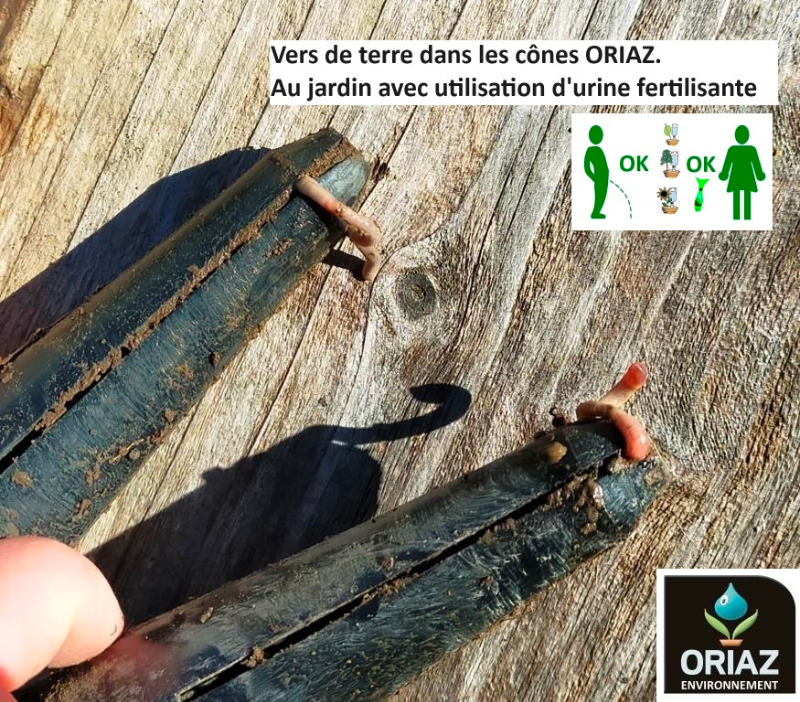 vers-oriaz-2.jpg
(Filesize: 291KB)
vers-oriaz-2.jpg
(Filesize: 291KB)
-
ORIAZ-2022...1-04.JPG (Filesize: 306KB)
-
 isa-2b_2024-01-04.jpg
(Filesize: 196KB)
isa-2b_2024-01-04.jpg
(Filesize: 196KB)
-
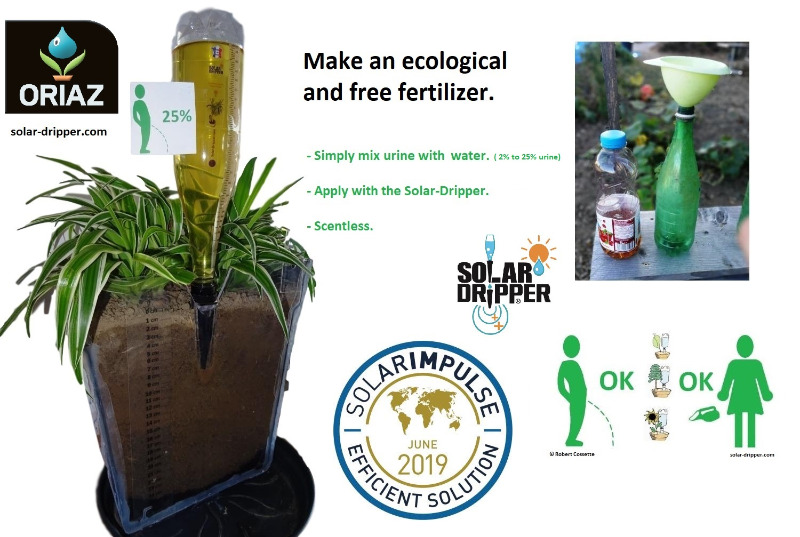 plante-tes...1-04.jpg
(Filesize: 134KB)
plante-tes...1-04.jpg
(Filesize: 134KB)
The following user(s) like this post: HAPitot
Please Log in to join the conversation.
You need to login to reply
Dear all,
My preference is to use urine in combination with compost - both are easily produced in a home environment.
I think what Robert is proposing should work well in small gardens. I rather apply diluted urine with the watering can. Storing properly separated urine for a few days will kill all pathogens - so no need to worry if you proceed like that. In order to reduce odors, you need to store the urine for about two weeks, depending on temperature.
You will find more tricks on odor prevention, application rates, etc... in the attached instructions.
H-A
My preference is to use urine in combination with compost - both are easily produced in a home environment.
I think what Robert is proposing should work well in small gardens. I rather apply diluted urine with the watering can. Storing properly separated urine for a few days will kill all pathogens - so no need to worry if you proceed like that. In order to reduce odors, you need to store the urine for about two weeks, depending on temperature.
You will find more tricks on odor prevention, application rates, etc... in the attached instructions.
H-A
Hanns-Andre Pitot
M.Eng. Environmental Pollution Control
presently in Seesen, Germany
M.Eng. Environmental Pollution Control
presently in Seesen, Germany
This message has an attachment file.
Please log in or register to see it.
Please Log in to join the conversation.
You need to login to reply
The use of a means of urine collection without cross contamination (ORIAZ Urinette) and the precise underground application with the Solar-Dripper allows urine to be applied throughout the crop the same day.
See the method here:
With these two added precautions a pre-treatment is no longer necessary and safety is demonstrated because human pathogens do not climb trees.
Anaerobic pathogens in the soil are simply cooked by over-oxygenated ground competition.
Without fecal contamination from a proper collection method (urinette) the initial pathogen risk is very very low.
And the subsurface application with the Solar-Dripper further reduces this theoretical risk by another factor of 100 to 1,000,000 according to the WHO guidelines.
See attached reference.
For crops like tomatoes you can consume the same day safely as there is no splashing risks like with old urine application methods.
See: solar-dripper.com/en/how-to-use-urine-fertilizer/
But if your urine collection does not prevent cross-contamination ( example using a diverting toilet) or if your application is less precise then it is required to wait or to treat urine.
The Solar-Dripper method is more efficient now since your urea can be applied the same day it is collected.
Using fresh urine means less odors and an efficiency gain for the roots to absorb nitrogen as ammonium (+) and phosphate (-) more easily.
The root nutrient chemical balance is preferable compared to nitrate (-) and phosphate (-) ions absorption
Robert Cossette
Engineer
ORIAZ Environnemnt.
See the method here:
With these two added precautions a pre-treatment is no longer necessary and safety is demonstrated because human pathogens do not climb trees.
Anaerobic pathogens in the soil are simply cooked by over-oxygenated ground competition.
Without fecal contamination from a proper collection method (urinette) the initial pathogen risk is very very low.
And the subsurface application with the Solar-Dripper further reduces this theoretical risk by another factor of 100 to 1,000,000 according to the WHO guidelines.
See attached reference.
For crops like tomatoes you can consume the same day safely as there is no splashing risks like with old urine application methods.
See: solar-dripper.com/en/how-to-use-urine-fertilizer/
But if your urine collection does not prevent cross-contamination ( example using a diverting toilet) or if your application is less precise then it is required to wait or to treat urine.
The Solar-Dripper method is more efficient now since your urea can be applied the same day it is collected.
Using fresh urine means less odors and an efficiency gain for the roots to absorb nitrogen as ammonium (+) and phosphate (-) more easily.
The root nutrient chemical balance is preferable compared to nitrate (-) and phosphate (-) ions absorption
Robert Cossette
Engineer
ORIAZ Environnemnt.
Robert Cossette
solar-dripper.com
solar-dripper.com
Attachments:
-
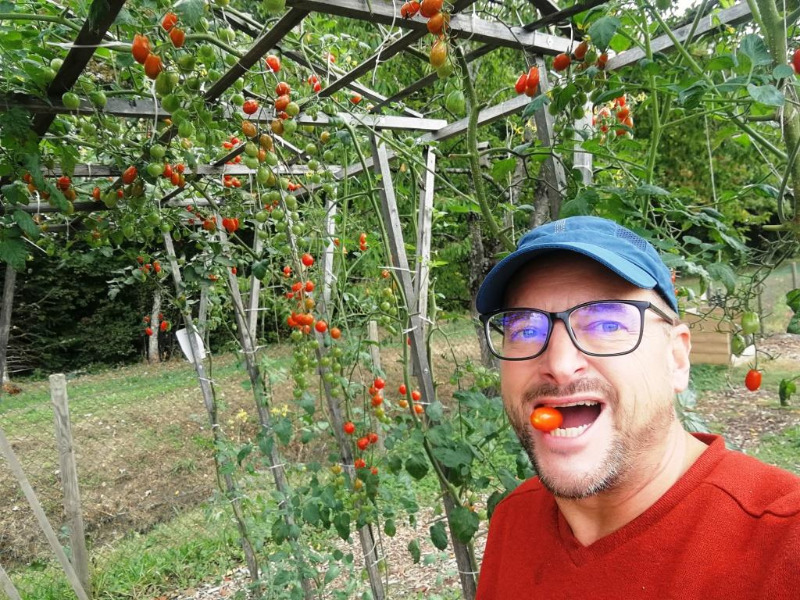 Robert-Cossette.jpg
(Filesize: 279KB)
Robert-Cossette.jpg
(Filesize: 279KB)
-
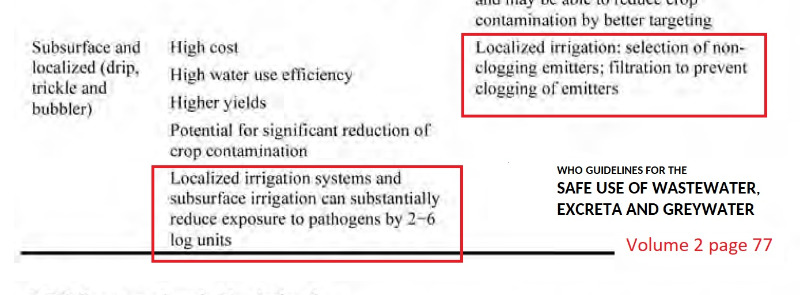 WHO-dripper.jpg
(Filesize: 66KB)
WHO-dripper.jpg
(Filesize: 66KB)
-
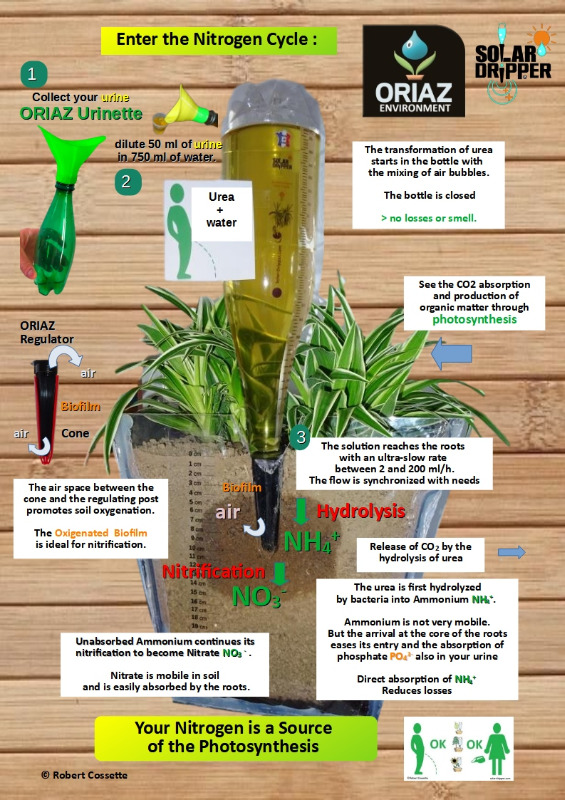 oriaz-urea...1-03.jpg
(Filesize: 216KB)
oriaz-urea...1-03.jpg
(Filesize: 216KB)
Please Log in to join the conversation.
You need to login to reply- bsoutherland
-
Less
- Posts: 20
- Karma: 1
- Likes received: 12
Re: Would you buy tomatoes fertilized with urine?
Use pyrolyzed crop waste to produce charcoal (biochar). Use biochar in UDDT to control odor and splashing. Urine-inoculated biochar is easy to handle and slow releases urine nutrients.
Please Log in to join the conversation.
You need to login to reply- Tore
-
- worked in sanitation for most of my life. taught plumbing. have plumbing and builders license, certified inspector in all facets of construction, PhD in public administration & have taught construction management in university, traveled numerous countries, Interest UDDT and sanitation & clean water
Less- Posts: 75
- Karma: 2
- Likes received: 27
Make sure the urine is inserted into the ground and not sprayed on the plants. In addition do not use any urine within 4 weeks of harvesting.
Sanitation & water consultant in developing countries
Please Log in to join the conversation.
You need to login to reply
Robert,
Up to about 10 years ago, I was promoting sanitation in a country town and district capital in Northern Uganda, called Adjumani. We called the approach a 'two track approach', one of the tracks was the promotion of ecological sanitation toilets, the other track consisted of a proper disposal (using wetlands) of the sludge coming from regular pit latrines:
Sanitation approach of GIZ in Adjumani town
Privately built ecosan toilets (UDDTs) in Adjumani
Utilization of UDDT fertilizers in Adjumani
In the ecosan approach, urine separating toilets were constructed, and the urine could be used locally on people's private plots. For the solids, we constructed a small hand-operated composting facility, even though these could also be dug into the fields after a storage time of 6 months in the toilets.
More than 100 people decided to build an ecosan toilet using there own personal money. The town was only contributing some special plastic parts for urine diversion, which were brought from the capital Kampala. This shows that some people were quite enthusiastic constructing such toilets. Apart from the fertilizers, one main promoter of the ecosan toilets was that the maintenance was a lot cheaper than the one of pit latrines. For the latter, you needed to have a tanker truck to come every few years to empty the pit, which was very expensive in the local context, whereas for the ecosan toilets, emptying could be done manually. Of course, the ecosan toilets will only work well if properly constructed and properly maintained (possibly the two main drawbacks).
The attitudes of the population were generally positive, especially among the more traditional folks. But it's really a personal choice of each and every resident.
Hanns-André
Up to about 10 years ago, I was promoting sanitation in a country town and district capital in Northern Uganda, called Adjumani. We called the approach a 'two track approach', one of the tracks was the promotion of ecological sanitation toilets, the other track consisted of a proper disposal (using wetlands) of the sludge coming from regular pit latrines:
Sanitation approach of GIZ in Adjumani town
Privately built ecosan toilets (UDDTs) in Adjumani
Utilization of UDDT fertilizers in Adjumani
In the ecosan approach, urine separating toilets were constructed, and the urine could be used locally on people's private plots. For the solids, we constructed a small hand-operated composting facility, even though these could also be dug into the fields after a storage time of 6 months in the toilets.
More than 100 people decided to build an ecosan toilet using there own personal money. The town was only contributing some special plastic parts for urine diversion, which were brought from the capital Kampala. This shows that some people were quite enthusiastic constructing such toilets. Apart from the fertilizers, one main promoter of the ecosan toilets was that the maintenance was a lot cheaper than the one of pit latrines. For the latter, you needed to have a tanker truck to come every few years to empty the pit, which was very expensive in the local context, whereas for the ecosan toilets, emptying could be done manually. Of course, the ecosan toilets will only work well if properly constructed and properly maintained (possibly the two main drawbacks).
The attitudes of the population were generally positive, especially among the more traditional folks. But it's really a personal choice of each and every resident.
Hanns-André
Hanns-Andre Pitot
M.Eng. Environmental Pollution Control
presently in Seesen, Germany
M.Eng. Environmental Pollution Control
presently in Seesen, Germany
The following user(s) like this post: Robert74
Please Log in to join the conversation.
You need to login to reply
Yes, you're right, people are bemused about fertilizing urine.
But after explanation and demonstration they are enthusiastic.
It may be too early to also talk about feces also but with a special process of 9 months I obtain a magnificent compost.
My visitors handle it without discomfort
odorless, pathogen-free and very fertile.
It's much safer than the sewer system.Pathogens are eliminated without risk of propagation as in our sewers.
No danger in the garden also.
But for the moment I am content with the valorization of urine which provides 80% of the solution with minimal cost and savings.
One step at a time
See pictures.
Robert
But after explanation and demonstration they are enthusiastic.
It may be too early to also talk about feces also but with a special process of 9 months I obtain a magnificent compost.
My visitors handle it without discomfort
odorless, pathogen-free and very fertile.
It's much safer than the sewer system.Pathogens are eliminated without risk of propagation as in our sewers.
No danger in the garden also.
But for the moment I am content with the valorization of urine which provides 80% of the solution with minimal cost and savings.
One step at a time
See pictures.
Robert
Robert Cossette
solar-dripper.com
solar-dripper.com
Attachments:
-
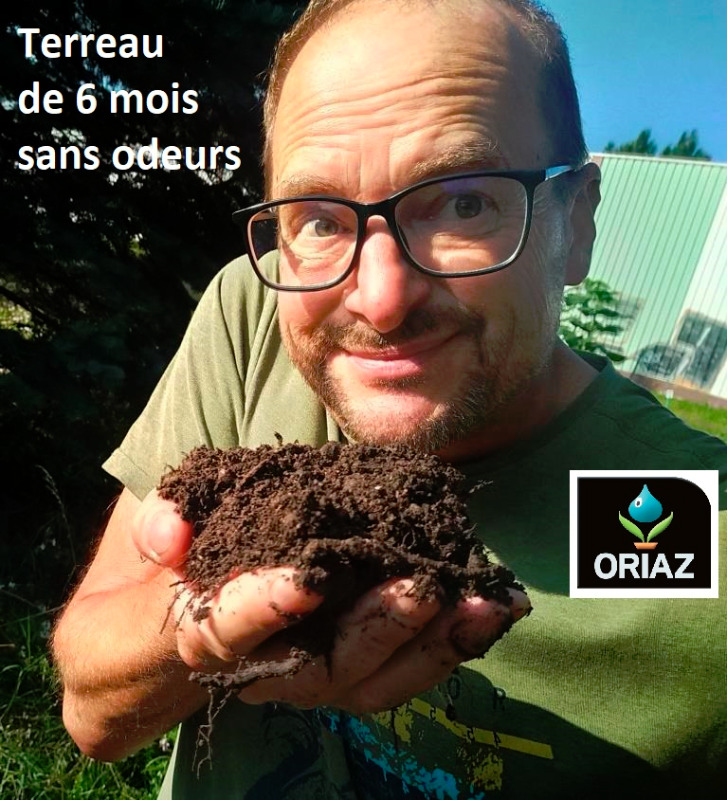 odeur-robert.jpg
(Filesize: 212KB)
odeur-robert.jpg
(Filesize: 212KB)
-
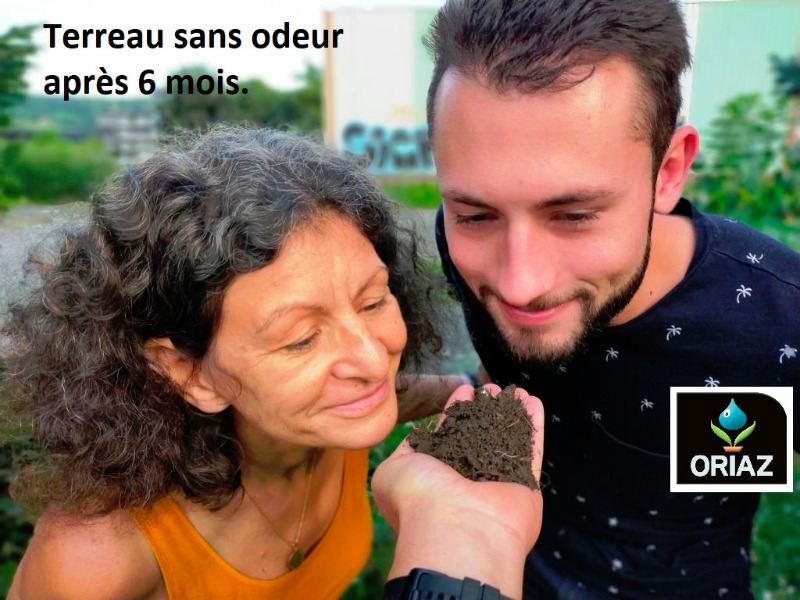 odeur-remi...anie.jpg
(Filesize: 168KB)
odeur-remi...anie.jpg
(Filesize: 168KB)
-
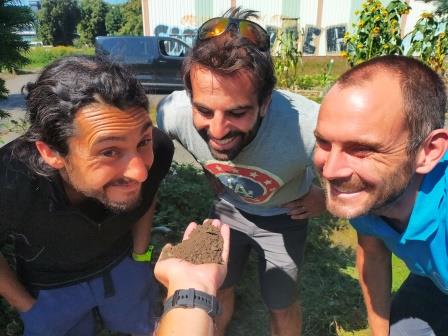 odeur-5.jpg
(Filesize: 39KB)
odeur-5.jpg
(Filesize: 39KB)
-
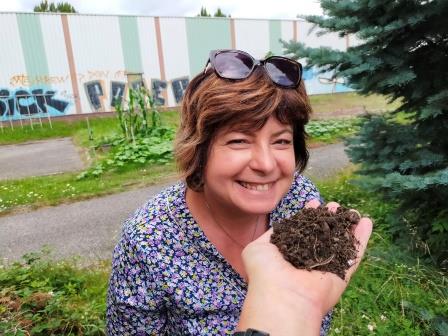 odeur-3.jpg
(Filesize: 45KB)
odeur-3.jpg
(Filesize: 45KB)
The following user(s) like this post: HAPitot
Please Log in to join the conversation.
You need to login to reply
PS: Let's say people tend to be bemused and amused about the use of urine as fertilizer, sorry for the confusion...
Hanns-Andre Pitot
M.Eng. Environmental Pollution Control
presently in Seesen, Germany
M.Eng. Environmental Pollution Control
presently in Seesen, Germany
Please Log in to join the conversation.
You need to login to reply
My experience would be that people tend to be bemused if I tell them that I am using urine to fertilize the fruits in my garden. That doesn't prevent them to pick the fruits, like currants, strawberries or apples.
In fact, I am using both stored urine and compost that I am also producing myself. The compost does not include feces, which are flushed into the drain. If I was including feces into the input of my compost, the reaction of visitors would possibly come out differently, depending, may-be, on how I would explain the process. But urine doesn't seem to be too much of an issue.
Best regards from my side,
In fact, I am using both stored urine and compost that I am also producing myself. The compost does not include feces, which are flushed into the drain. If I was including feces into the input of my compost, the reaction of visitors would possibly come out differently, depending, may-be, on how I would explain the process. But urine doesn't seem to be too much of an issue.
Best regards from my side,
Hanns-Andre Pitot
M.Eng. Environmental Pollution Control
presently in Seesen, Germany
M.Eng. Environmental Pollution Control
presently in Seesen, Germany
Please Log in to join the conversation.
You need to login to reply
Share this thread:
- Forum
- categories
- Resource recovery
- Fertiliser, soil conditioner, production of crops
- Would you buy tomatoes fertilized with urine?
Recently active users. Who else has been active?
Time to create page: 0.100 seconds








